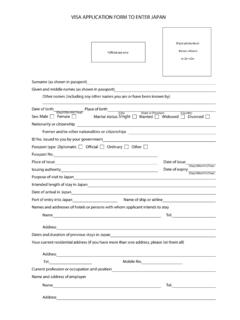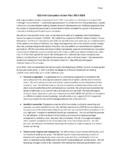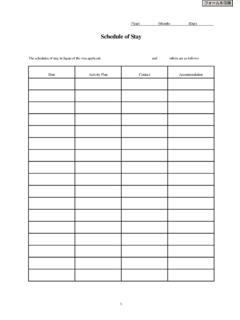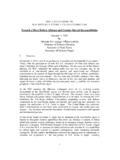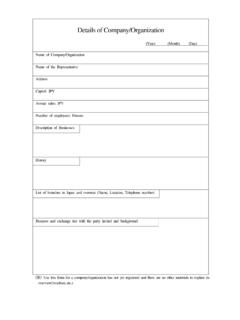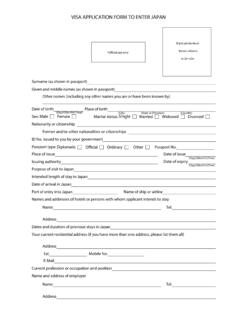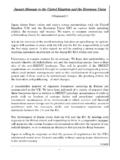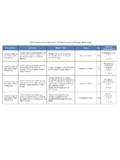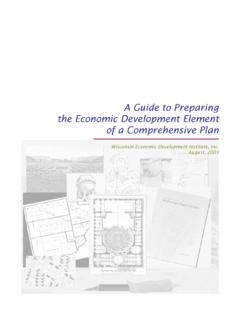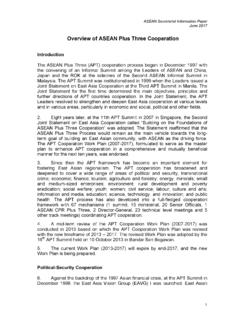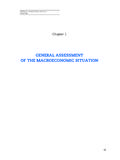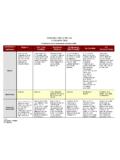Transcription of AGREEMENT ON COMPREHENSIVE ECONOMIC …
1 AGREEMENT ON COMPREHENSIVE ECONOMIC PARTNERSHIP. AMONG JAPAN AND MEMBER STATES OF THE ASSOCIATION. OF SOUTHEAST ASIAN NATIONS. Table of Contents Preamble Chapter 1 General Provisions Article 1 General Definitions Article 2 Principles Article 3 Objectives Article 4 Transparency Article 5 Confidentiality Article 6 Taxation Article 7 General Exceptions Article 8 Security Exceptions Article 9 Non-governmental Bodies Article 10 Relation to Other Agreements Article 11 Joint Committee Article 12 Communications Chapter 2 Trade in Goods Article 13 Definitions Article 14 Classification of Goods Article 15 National Treatment on Internal Taxation and Regulation Article 16 Elimination or Reduction of Customs Duties Article 17 Customs Valuation Article 18 Non-tariff Measures Article 19 Modification of Concessions Article 20 Safeguard Measures Article 21 Measures to Safeguard the Balance of Payments Article 22 Customs Procedures Chapter 3 Rules of Origin Article 23 Definitions Article 24 Originating Goods Article 25 Goods Wholly Obtained or Produced Article 26 Goods Not Wholly
2 Obtained or Produced Article 27 Calculation of Regional Value Content Article 28 De Minimis Article 29 Accumulation Article 30 Non-qualifying Operations Article 31 Direct Consignment Article 32 Packing Materials and Containers Article 33 Accessories, Spare Parts, Tools and Instructional or Other Information Materials Article 34 Indirect Materials Article 35 Identical and Interchangeable Materials Article 36 Operational Certification Procedures Article 37 Sub-Committee on Rules of Origin Chapter 4 Sanitary and Phytosanitary Measures Article 38 Scope Article 39 Reaffirmation of Rights and Obligations Article 40 Sub-Committee on Sanitary and Phytosanitary Measures Article 41 Enquiry Points Article 42 Non-application of Chapter 9. Chapter 5 Standards, Technical Regulations and Conformity Assessment Procedures Article 43 Objectives Article 44 Scope Article 45 Reaffirmation of Rights and Obligations Article 46 Cooperation Article 47 Enquiry Points Article 48 Sub-Committee on Standards, Technical Regulations and Conformity Assessment Procedures Article 49 Non-application of Chapter 9.
3 Chapter 6 Trade in Services Article 50 Trade in Services Chapter 7 Investment Article 51 Investment Chapter 8 ECONOMIC Cooperation Article 52 Basic Principles Article 53 Fields of ECONOMIC Cooperation Article 54 Sub-Committee on ECONOMIC Cooperation Article 55 Work Programmes for ECONOMIC Cooperation Article 56 Resources for ECONOMIC Cooperation Article 57 Implementation of ECONOMIC Cooperation Activities Article 58 Non-application of Chapter 9. Chapter 9 Settlement of Disputes Article 59 Definitions Article 60 Scope of Application Article 61 Contact Points Article 62 Consultations Article 63 Good Offices, Conciliation and Mediation Article 64 Establishment of Arbitral Tribunals Article 65 Composition of Arbitral Tribunals Article 66 Third Parties Article 67 Functions of Arbitral Tribunals Article 68 Proceedings of Arbitral Tribunals Article 69 Draft Award and Award Article 70 Suspension and Termination of Proceedings Article 71 Implementation of Award Article 72 Compensation and the Suspension of Concessions Article 73 Expenses Chapter 10 Final Provisions Article 74 Table of Contents.
4 Headings and Subheadings Article 75 Review Article 76 Annexes and Notes Article 77 Amendments Article 78 Depositary Article 79 Entry into Force Article 80 Withdrawal and Termination Annex 1 Schedules for the Elimination or Reduction of Customs Duties Annex 2 Product Specific Rules Annex 3 Information Technology Products Annex 4 Operational Certification Procedures Annex 5 Work Programmes for ECONOMIC Cooperation Preamble The Governments of Japan, and Brunei Darussalam, the Kingdom of Cambodia, the Republic of Indonesia, the Lao People's Democratic Republic, Malaysia, the Union of Myanmar, the Republic of the Philippines, the Republic of Singapore, the Kingdom of Thailand and the Socialist Republic of Viet Nam, Member States of the Association of Southeast Asian Nations (hereinafter referred to as ASEAN );. Recalling the Joint Declaration signed in Phnom Penh, Cambodia on 5 November 2002 and the Framework for COMPREHENSIVE ECONOMIC Partnership between Japan and the Association of Southeast Asian Nations signed in Bali, Indonesia on 8 October 2003.
5 Desiring to deepen the relationship between Japan and ASEAN, which is built on mutual confidence and trust in wide-ranging fields covering not only political and ECONOMIC areas, but also social and cultural areas;. Inspired by the continuous development of ASEAN. through ECONOMIC activities among Japan and ASEAN Member States, and the significant progress in the relationship between Japan and ASEAN which has spanned thirty years of ECONOMIC ties that have been expanding over a wide range of areas;. Confident that a COMPREHENSIVE ECONOMIC partnership between Japan and ASEAN (hereinafter referred to as AJCEP ) will strengthen their ECONOMIC ties, create a larger and more efficient market with greater opportunities and larger economies of scale, and enhance their attractiveness to capital and talent, for mutual benefit;. Recognising that multi-layered and multi-faceted bilateral and regional efforts towards strengthening ECONOMIC relations among Japan and ASEAN Member States will facilitate the realisation of such COMPREHENSIVE ECONOMIC partnership.
6 Sharing the view that such COMPREHENSIVE ECONOMIC partnership should benefit from, and be complementary to, the ECONOMIC integration and integrity of ASEAN;. Recognising further the various stages of ECONOMIC development among the ASEAN Member States;. Confident that this AGREEMENT , covering areas such as trade in goods and services, and investment, would serve as an important building block towards ECONOMIC integration in East Asia;. Recalling Article XXIV of the General AGREEMENT on Tariffs and Trade 1994 and Article V of the General AGREEMENT on Trade in Services in Annex 1A and Annex 1B, respectively, to the Marrakesh AGREEMENT Establishing the World Trade Organization, done at Marrakesh, 15 April 1994. (hereinafter referred to as WTO AGREEMENT );. Recognising the role of regional trade agreements as a catalyst in accelerating regional and global liberalisation in the framework of the multilateral trading system;. Reaffirming the rights and obligations of each Party under the WTO AGREEMENT and multilateral, regional and bilateral agreements and arrangements; and Determined to establish a legal framework for such COMPREHENSIVE ECONOMIC partnership among the Parties, HAVE AGREED as follows: Chapter 1.
7 General Provisions Article 1. General Definitions For the purposes of this AGREEMENT , the term: (a) ASEAN Member States means Brunei Darussalam, the Kingdom of Cambodia, the Republic of Indonesia, the Lao People's Democratic Republic, Malaysia, the Union of Myanmar, the Republic of the Philippines, the Republic of Singapore, the Kingdom of Thailand and the Socialist Republic of Viet Nam collectively;. (b) customs authority means the competent authority that is responsible for the administration and enforcement of customs laws and regulations;. (c) days means calendar days, including weekends and holidays;. (d) GATS means the General AGREEMENT on Trade in Services in Annex 1B to the WTO AGREEMENT ;. (e) GATT 1994 means the General AGREEMENT on Tariffs and Trade 1994 in Annex 1A to the WTO. AGREEMENT . For the purposes of this AGREEMENT , references to articles in GATT 1994 include its Notes and Supplementary Provisions;. (f) Harmonized System or HS means the Harmonized Commodity Description and Coding System set out in the Annex to the International Convention on the Harmonized Commodity Description and Coding System, and adopted and implemented by the Parties in their respective laws.
8 (g) newer ASEAN Member States means the Kingdom of Cambodia, the Lao People's Democratic Republic, the Union of Myanmar and the Socialist Republic of Viet Nam;. (h) Parties means Japan and those ASEAN Member States for which this AGREEMENT has entered into force collectively; and (i) Party means either of Japan or one (1) of ASEAN. Member States for which this AGREEMENT has entered into force. Article 2. Principles The Parties reaffirm the importance of realising the AJCEP through both this AGREEMENT and other bilateral or regional agreements or arrangements, and are guided by the following principles: (a) the AJCEP shall involve Japan and all ASEAN. Member States and includes a broad range of sectors focusing on liberalisation, facilitation and ECONOMIC cooperation;. (b) the integrity, solidarity and integration of ASEAN shall be maintained in the realisation of the AJCEP;. (c) special and differential treatment is accorded to ASEAN Member States, especially the newer ASEAN.
9 Member States, in recognition of their different levels of ECONOMIC development; additional flexibility is accorded to the newer ASEAN Member States;. (d) recognition shall be given to the provisions of the ministerial declarations of the World Trade Organization on measures in favour of least- developed countries;. (e) flexibility should also be given to address the sensitive sectors in Japan and each ASEAN Member State; and (f) technical assistance and capacity building are important elements of ECONOMIC cooperation provided under this AGREEMENT . Article 3. Objectives The objectives of this AGREEMENT are to: (a) progressively liberalise and facilitate trade in goods and services among the Parties;. (b) improve investment opportunities and ensure protection for investments and investment activities in the Parties; and (c) establish a framework for the enhancement of ECONOMIC cooperation among the Parties with a view to supporting ASEAN ECONOMIC integration, bridging the development gap among ASEAN Member States, and enhancing trade and investment among the Parties.
10 Article 4. Transparency 1. Each Party shall, in accordance with its laws and regulations, make publicly available its laws, regulations, administrative procedures and administrative rulings and judicial decisions of general application as well as international agreements to which the Party is a party, that pertain to or affect the implementation and operation of this AGREEMENT . 2. Each Party shall make publicly available the names and addresses of the competent authorities responsible for laws, regulations, administrative procedures and administrative rulings, referred to in paragraph 1. 3. Each Party shall, upon the request by another Party, respond to specific questions from, and provide information to, the latter, in the English language, with respect to matters referred to in paragraph 1. Article 5. Confidentiality 1. Nothing in this AGREEMENT shall require a Party to provide confidential information, the disclosure of which would impede law enforcement of the Party, or otherwise be contrary to the public interest, or which would prejudice legitimate commercial interests of any particular enterprise, public or private.

